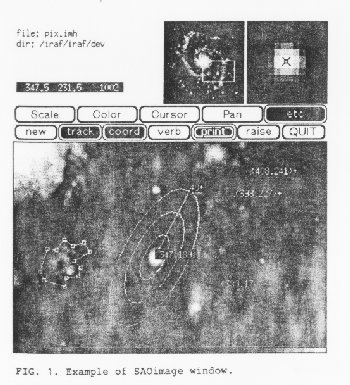SAOIMAGE, M.VanHilst(1990),
Bulletin of the American Astronomical Society, Vol. 22, p.935.
Smithsonian Astrophysical Observatory
This report covers the period through January 1990.
1. INTRODUCTION
SAOimage (pronounced S-A-0-image), is an X windows-based interactive
program to display astronomical image data on a workstation screen.
SAOimage was developed by the author and funded by NASA as part of
the Smithsonian Astrophysical Observatory's PROS analysis software
package for the U.S. ROSAT Science Data Center. It can run either
stand-alone, reading FITS (SIMPLE=T), IRAF (.imh), and array image
files directly, or be connected to IRAF, emulating NOAO's imtool,
for interactive image display and analysis. Originally developed
for X10, under the name "ximage", SAOimage now uses X1l
and compatible display servers and runs under UNIX (SYSV and BSD)
or VMS. (The VMS port was done by Jay Travisano of the Space Telescope
Science Institute.)
II. OVERVIEW
SAOimage concentrates on display features, leaving image analysis
to other programs. Within its workstation window, it provides a
large display area, a magnifier subwindow, a pan and zoom guide,
a color bar, and a button control panel. A pop-up editor facilitates
setting parameters and entering new image files. On color
workstations (with 32 or more colors), a directly manipulable color
table graph can be popped up. For workstations without color,
halftone display modes are also supported.
The SAOimage user interface was designed to be easy to
learn and use. With the mouse, the user can manipulate the
color map, pan and zoom the image, and outline regions of
interest. By making selections on the button menu, the user
can rescale the image, select a different color palette, specify
the region shape, dispatch a hardcopy to the printer, or specify
the mode of mouse control. Various optimizations have been
used to make the response to user commands fast and fluid.

III. FEATURES
To display data, with a large range of values, within the range
of available display colors, SAOimage provides five different
modes of scaling; linear, wrapped linear, geometric (root),
exponential (log), and histogram equalization. By adjusting
the scaling window, selecting the scaling mode, and possibly
adjusting the weighting parameters, structural features in the
image data can be made apparent, even on halftone monitors.
Several shapes are provided for outlining regions of interest.
These include points, arbitrary polygons, rotatable boxes and
ellipses, and annuli (circular, elliptical, and rectangular).
Regions can be written to and read from ASCII disk files. The
PROS IRAF tasks can read these ASCII files to make image
masks and perform various spatial analyses.
SAOimage can display a continuous readout of the pointer coordinates
and the corresponding pixel value, or display a table of pixel
values within a small square. The pointer position and surrounding
image can be continuously displayed in the magnifier subwindow.
For color workstations, several default colormaps are provided.
The colormap can be interactively stretched and shifted, and the
colormap table can be directly manipulated. Colormap tables can
be written to and read from ASCII disk files. An additional mode
of manipulation allows gamma adjustment of colors. For halftone
display, matrix dithering and error diffusion are both supported.
Because it uses Xll for the display, SAOimage itself can
be running on one machine while the display and user interface
are on a different machine or terminal (nearby or far away).
IV. AVAILABILITY
Users who intend to use SAOimage with IRAF should request
it from NOAO when they request IRAF. Others can obtain source code
from the High Energy Astrophysics Division of the Smithsonian
Astrophysical Observatory. Executables for many common machines
are also available. SAOimage has compiled and run successfully
on Convex, DG Aviion, DECstation, VAXstation (Ultrix 3.x and VMS 5.x),
Sun-3, Sun-4, Sun-386i, and many HP and HP-Apollo machines.
For users with access to Internet, source code and executables can be
copied from cfa250.harvard.edu (128.103.40.250) via anonymous ftp.
Large files may be compressed, requiring UNIX uncompress or Zcat to
decompress them.
For more information about SAOimage, please contact us
at the following address:
Smithsonian Astrophysical Observatory
attn. Mike VanHilst MS 3
60 Garden Street
Cambridge, MA 02138
e-mail:
mvh@cfa.harvard.edu (Internet)
mvh@cfa (Bitnet)
CFA::VANHILST or 6699::VANHILST (SPAN)
M. VanHilst
Harvard-Smithsonian Center for Astrophysics
Return to SAOimage home page

